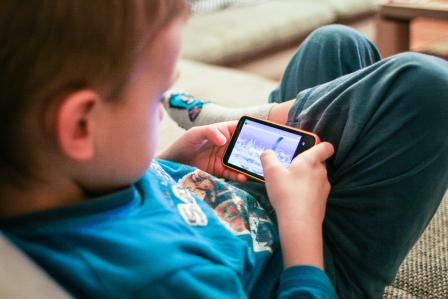Personalized learning has such a nice ring to it, doesn’t it? Conjures up images of one-to-one attention, customized curricula, and care and concern for the needs of each child. It suggests that the child’s learning experiences are uniquely designed, taking into account where the child is developmentally.
But in the landscape of the new B.C. Education plan, personalized learning is nothing like you imagine. What you think is “personalized” actually means “technologized.” The personal aspect is related to having a PC (personal computer). We’ve forgotten, haven’t we, that that’s what they were first called back in the 1980s: personal computers…
Personalized learning will mean that more often than not your child will be interacting with his/her personal computer while completing courses online.
It makes so much sense to try to sell this doublespeak version of “personalized” to parents. It’s so much cheaper to buy a new computer than to pay a teacher’s salary year after year.
When you are a politician who believes that all that government should do is to save “taxpayers” money, this would be very attractive. It’s much cheaper to buy 100 new computers for a school than to pay the salaries of learning specialist teachers.
Given that the B.C. Education Plan includes the decategorization of students with special needs, an action that would render null and void the B.C. Teachers’ Federation argument about class composition, one must wonder if personalized learning is more about accounting than it is about what students need.
It’s not just children with special needs who will suffer when a cold computer replaces a teacher’s care and attention. Children who have no identified problem with learning but who do not have the ability to manage time will also struggle with the impersonal aspect of personalized learning.
It’s easy to miss this impersonal aspect when you look at the B.C. ED plan website. One would think that the B.C. government had suddenly changed its mind and finally agreed with teachers about student needs. But if you look closely at the key elements of the plan, you will notice that technology plays a significant role.
The key elements of the new B.C. Education plan are:
- Personalized learning for every student
- Quality teaching and learning
- Flexibility and choice
- High standards
- Learning-empowered technology.
A careful analysis of the plan reveals that elements #1 and #5 are closely intertwined. It is the technology that will create the personalized aspect of the plan. Is is the technology that will provide the “choice” as students can choose to complete some courses online.
How many children do you know who can successfully focus on school work for hours at a time when in front of a computer?
What about those families who can’t afford to provide computers or iPads for their children?
Remember reading about how wonderful Distributed Learning was going to be? What happened instead was a high failure rate and students returning to school to take courses they could not complete alone at home in front of their personal computers.
There is nothing truly personal about personalized learning, unless you count the personal profits that will be made through the continual sale to school districts of computers that will need to be regularly updated.
One would think that this digital generation, those born into a world with the Internet already in existence, would welcome spending more time on computers. But they don’t. They know that a computer cannot replace the attention of a teacher.
If the B.C. Liberal government truly wanted to introduce personalized learning into B.C. public schools, they would provide enough funding so that public schools can have what private schools frequently advertise: small classes and full support for students with special needs.
Providing enough funding so that public schools can offer truly personalized learning would require an investment in the public education system that the current B.C. Liberal government is ideologically opposed to, given its track record over the past 14 years.
Personally, I’m not holding my breath that that investment will happen any time soon.



I am so tired of buzz terms like ‘personalized learning’ and ’21st century education.’
Teachers are university and real-world-trained EXPERTS on child development, child psychology, development, pedagogy, multiple intelligences, literacy, numeracy, critical thinking, current events, and more. We always do our best to respond to the individual social, emotional, and intellectual well-being and growth of each student. However, with increasing class sizes and diverse needs among students (ie. that tricky ‘composition’ issue), it’s worryingly difficult to do enough for our students. There’s no defined ‘end’ to our work, which is why we end up feeling pressure to do more and more and more, and we bring that stress home with us, on vacation, to Thanksgiving dinner. Why? Because we work with wonderful, complicated students. And because there isn’t enough support out there telling us “it’s ok. You’re doing a good job.” Support requires funding. And funding requires responsible government.
Spend money on human connection. On learning. On excursions, and supplies. Don’t spend money on big screen tv’s that don’t get used, or fashionable technology that quickly becomes passé. Spend money on experiences, and on Teachers who are trained professionals for facilitating those learning experiences.
LikeLiked by 1 person
Nicely stated. Years ago the government thought graphing calculators were the solution in math. Within a year there were not enough for students to be assigned one. Then there were class sets only used in class. Then students were encouraged to buy one at $130. Now apps can replace them but each version requires an individual lesson on how to use them so instruction essentially becomes impossible. Any device you can download an app on is wireless and encourages cheating by making it so damn easy to get away with it.
LikeLiked by 1 person
Just wanted to add links here to other discussions about so-called “personalized learning”. As it is, what is being called personalized learning is actually personalized instruction which is really mechanized/technologized teaching: https://www.dropbox.com/s/um6srr6y45hty2q/Personalized%20Instruction%20Meta%20Analysis%20by%20Type%20U%20of%20Colorado%20with%20notes.pdf?dl=0
And more concerns echoed here: http://www.politico.com/story/2014/11/online-education-run-amok-113208.html
LikeLike
More concerns about adding more screen time to children’s lives:
http://www.nytimes.com/2015/01/30/opinion/can-students-have-too-much-tech.html?_r=2
““Students who gain access to a home computer between the 5th and 8th grades tend to witness a persistent decline in reading and math scores,” the economists wrote, adding that license to surf the Internet was also linked to lower grades in younger children.
In fact, the students’ academic scores dropped and remained depressed for as long as the researchers kept tabs on them. What’s worse, the weaker students (boys, African-Americans) were more adversely affected than the rest. When their computers arrived, their reading scores fell off a cliff. “
LikeLike
The research is in: Kids under 12 should be limited in their use of technology:
http://www.huffingtonpost.com/cris-rowan/10-reasons-why-handheld-devices-should-be-banned_b_4899218.html
LikeLike
Well said Lizanne. There is a clear “end around” run. Look like you are making education matter, but really that is not the agenda at all. It would appear this is yet another attempt to end “brick and mortar” schools. Via technology, one teacher can manage twice even three times as many students with virtually no direct contact. The loss of most schools and their support staff and two to three fold reduction in teachers, generates massive cost savings. It continues to stratify and separate students. Private schools all advertise their class size. So if you have enough money for private education, no worries. Otherwise . . . This attack on public education is reaching fever pitch. Where are the outcries from parents whose children will lose opportunity? Teachers can complain forever, but without parent action, nothing will change at all. Parents the time has come to advocate for your children and their future. The misdirection of cost efficiency must be stopped. Stratification of society is gaining momentum and I wonder when the tipping point will be reached. It may not have passed yet but it is getting closer. Welcome back to school everyone!
LikeLike
These comments all represent the wisdom of teachers! We need to build on that – not turn over the most important aspect of a healthy society to machines devised by corporations!
LikeLike
I’m bound become coming back to this article once more later to revisit a
few of the finer things.
LikeLike
Thanks Luciana. Which “finer things” would that be?
LikeLike
Can you say more about what those are Luciana?
LikeLike